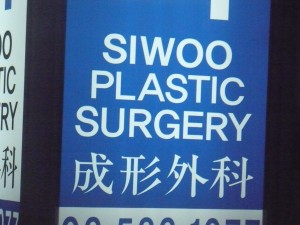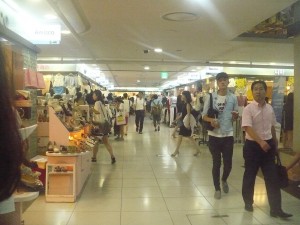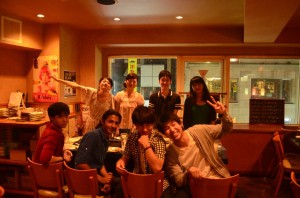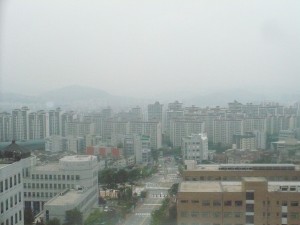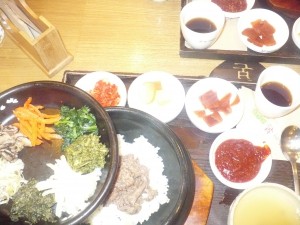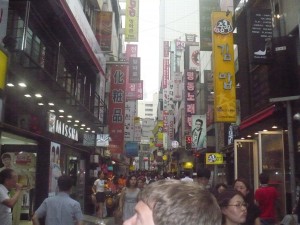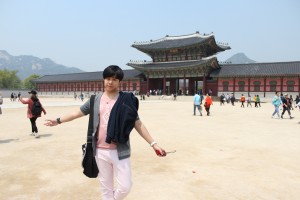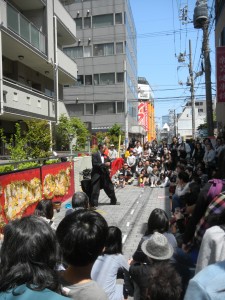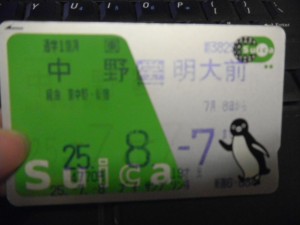Below is a link to a “dorm tour” video that I recorded. Note the awesomely futuristic entrance doors that you have to swipe through to get to the elevator.
Asia-Pacific
Disclaimer: My last post left everyone with the promise of more frequent updates. . . ooops. Hear me out readers, I fully intended to divulge all of the experiences I have had and expose the juicy “secrets” about Korean society that my students told me. However, I found myself caught in an (internet-less) weekend trip which left me with little time to post when I got back (had to plan out that week’s class schedule/plans) followed by weekdays spent with said students even after classes were done for the day (I’m too popular I suppose). Nevertheless I’m free now so prepare yourselves to hear some amazing tales of . . . well read the title of the post. . . HERE WE GO. . . .
In one of the many meetings outside of the classroom with my wonderful students, we were in a coffee house when I noticed that a woman was wearing a surgical mask and sunglasses. Thinking little of it, I casually point her out to my students saying “oh, she must feel sick.” “No,” my students replied, “she just had plastic surgery.” Surprised, I asked my students how they knew, to which they replied that the attire of a surgical mask and large sunglasses usually indicated that someone was recovering from surgery. This seemed strange because to me this woman looked no older than 25, an opinion which I quickly voiced. “Ah,” my students said almost in unison “most people here get ‘the’ surgery done here around university age or younger” and by “the surgery” my students informed me that they were referring to “double eye-lid surgery.” My students briefly explained that Western/large eyes are coveted by many Koreans (yes, I’ve been told that gentlemen sometimes get the same procedure done) and it has become an almost customary “graduation gift” from parents to children to have the procedure done (my students have informed me that it is quite cheap and from what I’ve seen there is no shortage of plastic surgeons here). The exact steps in the procedure are unknown to me (perhaps some research shall be done), but the gist is incisions are made on both eyelids and “brow fat” is removed to create an extra layer of skin that resembles Western eyelid creases (resulting in the much-coveted “larger eyes”). I can’t help but think how strange it is that a significant percentage of people my age (my students estimated that 1 out of 5 Koreans have had this procedure, and they thought they were underestimating, especially with larger cities such as Seoul) have gone under the knife to alter their appearance; usually you hear about 40-somethings trying to keep up their youthful appearances, but from what I have heard/experienced, the “surgery craze” is about the population conforming to a idealized beauty that seeks a “Western standard.”
To summarize the “surgery craze” my students told me a (supposedly popular) joke:
“Every woman in Gangnam (Soho-like area of Seoul, also the inspiration of PSY’s catchy tune) looks identical because they’ve all gone to the same doctor.”
Above: A sign for one of the many plastic surgery offices that clutter the streets of Gagnam (L); underground/subway shopping venues where you can easily haggle a ₩10,000/$10 shirt down to ₩5,000/$5 (R)
The final topic of this post is one that still astounds me: the work ethic that the students of South Korea must exhibit while in high school. When I asked my students the hours of their typical school day in high school they told me “7am to 10”. As in 10 pm. Might I also add that many students here apparently can sign up for additional “study school” after they are dismissed at 10 pm. They eat all meals at school, to which I asked if their parents missed them while they (my students) were at school. Their response? “A little, but they knew it was necessary to get into University.” With hours like these, I asked my students if they had any comments about Western schooling systems to which one of my (quite insightful) students responded in a heartbreaking manner “when I watched Western shows as a kid and saw slumber parties and playing in the front yard, I felt envious because I knew that the childhood those children had would be one I would never experience.” Cue the foreigner tearing up in the middle of a crowded coffee shop. It is a strange thing to acknowledge as something that is a cultural “privilege,” but I have discovered a tremendous amount of gratitude for the free time (however sparse I thought it was back then) that I enjoyed after school between dinner and bedtime. How strange are the things we come to appreciate when we are away from home? Nonetheless, Korea has not ceased to amaze me, and I cannot wait to discuss topics I used to consider “normal/average/not worth discussing” all the while continuing my enjoyment in experiencing the uniqueness that is Korean culture.
My first week teaching English to college students at Dankook University (as part of my 3 week internship that precedes my 4 week academic program) has been nothing short of an amazing and enlightening experience. I teach from 9 to 4 in two-hour blocks. Each two hour block ends with a new rotation of students who I have already grown to respect immensely. Not only are they dedicated and respectful to me (even if some are a few years my senior thanks to the Korean age system), but they are so enthusiastic in ensuring that I enjoy my stay in Korea. While we are encouraged to meet with our students outside of class (for dinner, shopping, bowling, etc; it is up to the students and teacher what activity they will do) at least once during the 3-week English Village program, already I have seen most of my students 3 times to search for local hot spots. Essentially, as eager as I am to teach them about American culture (amongst other things in class such as complex grammar rules, colloquialisms, how to order in an English-speaking restaurant, etc), they are eager to indulge my silly-Western requests to eat kimbap or samgyeopsal nearly every day.
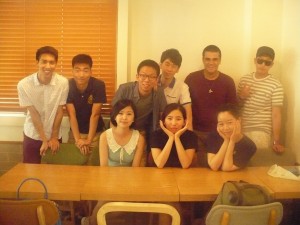
- Photo of some of my fantastic students and I along with my equally-wonderful co-teacher (to the far left; each teacher is assigned a partner teacher that has their class combine with yours for group activities)
While my students are in every way shape and form superb learners (in fact, they’re superb people), their is one major difference that I still cannot fathom. Despite the constant 85+ degree weather, my students do not sweat nor do they wear deodorant NOR do they smell in 90 degree heat with 100% humidity. Pure insanity is what I would say that situation is. In fact, while I brought 3 travel-size sticks of deodorant, I asked my students where I could find more (at the time I had yet to stumble across any in any of the convenient stores that are a staple in Jukjeon). The look of puzzlement that most of my male students gave me told me everything: I need to ransack all of Korea to find deodorant for less than $8 (which I saw in one of the mega-stores,shoved in a dark corner like a black-market item).
But there is an upside to the extreme heat: delicious, cold, summer treats with the favorite being “patbingsu.” Patbingsu is shaved ice with ice cream, typically fruit (or sweet red beans). I better watch out for the “freshmen 15 version 2.0/ version Korea,” because I have yet to encounter a food here that I would not eat incessantly.
I will post more often from now on, with my next topic being the fascinating exchanges I have had with my students (whom, despite still being English learners, as absolutely eloquent in expressing their opinions on hot-button topics).
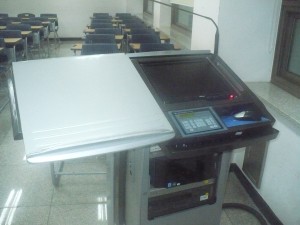
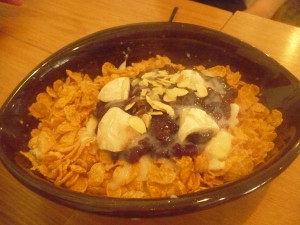 Left: My high-tech podium in my classroom, complete with a hidden computer.
Left: My high-tech podium in my classroom, complete with a hidden computer.
Right: Patbingsu (a “brunch” variation, with corn flakes, mochi, bananas, cashews, shaved ice, and ice cream).
It has been 3 months since I have been in Japan. I am very glad to have lived here, but very soon I will say goodbye to my friends here and return to my normal life in American. Recently, when I was asked to write something to put in my neighbor unit’s wall, I wrote “only friends remain.” When we all return home, all we have left in Japan are our friends. The following day, one of my friends in that unit had taken of picture of my note on the wall and said it was really moving.

I had actually tried to extend my study abroad by a semester, but unfortunately I was not able to. The semester overlap for Meiji and New Paltz in the fall semester. Thus if anyone is thinking of studying for a year, start in the fall. Plus, because I only applied for scholarship funds for one semester, I will not be able to receive the same scholarships if I try to extend half-way through this semester. Thus, really consider if you want to do a semester or a year before studying abroad. For everyone, I recommend a year because a semester will go by quickly before you realize that there is not much time left.
When in Japan, I recommend going to a nomihoudai and tabehoudai, which are all-you-can-drink and all-you-can-eat for a set price and set time limit. I went twice with people from Meiji who have studied abroad at New Paltz. The second time I went, there was another student from New Paltz there who was visiting Japan for two weeks. Both times I ate yakisoba, okonomiyaki and monjya. I will cook those when I come back home if I ever miss the taste!
Unfortunately, my bicycle was taken away last week because I parked it by the train station. Usually in Japan, they will give illegal parked bicycles a red tag. After a day they would just take the bicycle. However, they cheated by putting both tags in one day. I had to go about 30 minutes away from where I lived and pay to get it back. My front wheel broke on the way home too. Once again I had to repair it. The sad part is that the money I put in for repairs and fine is more than how much I paid for the bicycle.
Recently, one of my friends ended up setting off the fire alarm at 8PM by baking pie. The whole time the alarm was ringing, but luckily my headset blocked off the noise for me. I was surprised to see that the unit next door had smoke blowing out of their door. Later I walked into that unit and opened the microwave to see for myself the charred pie. Everyone in the dorm was outside, and for the first time, there was a small sense of togetherness. Unlike the dorms in America, we do not have official events to connect each other. Thus, other people and me appreciated the fact that my friend set off the fire alarm. My friend was really unhappy because her mistake made police and firefighters come as well as disturbing everyone else. I attempted to cheer her up by inviting her to do fireworks. It might seem like a joke to invite her to something related to fire, but I really meant for it to be a way to remember what happened that day in a different way. After some persuasion and good timing, she eventually agreed to do fireworks with me and our friends and was not longer sad over about what happened.
That’s it for now, look forward to my next post!
-Sampson Bui
The 14 hour flight to Korea was surprisingly short; I was able to sleep at least half the way, and it was super comfortable. If only. . . In all seriousness the flight crew was extremely polite, and once we touched down immigration/security were accommodating and helpful in getting me to the meeting area that Dankook had established. Getting in around 430, I found the welcoming committee (around ten Dankook students who, thankfully, were fluent in English). Although we had to wait for other flights (some of which had been delayed an hour or two) and got to the campus around 830, I had a surprising amount of energy (despite little sleep on the plane) and a group of fellow students (around 8 in total, myself included) went off to explore the town, the size of which I would compare to Syracuse (a bit more compact). Although none of us had an appetite at the time, we did manage to sample some of the convenient store snacks (7-Elevens in Korea have some really interesting options for food).
Day 2 and the morning of Day 3 were reserved for orientation, but several groups decided to venture out to Seoul. First of all, the public transportation buses have features that you would find in “charter buses”: nice seats, televisions (nice flatscreens at that), window curtains, and controllable air conditioning. The ride was roughly 35-40 minutes, and soon we found ourselves in Myeong-dong (a section of Seoul that I would say is a miniature and again, compact, Times Square). Food (both in restaurants and street vendors) was delicious and fabulously inexpensive; the photo of food shows a meal that I purchased for only 8,000 won which would equate to around $7.50. I was also brave enough to try a packet of dried/roasted squid,which coincidentally is now my favorite street food (so far).
Restaurants in Jukjeon have been very patient (so far) in helping the foreigner students in deciphering the few menus that don’t have pictures/ Romanized spelling of items (which for the most part are cognates of American food). A key difference here that I have noticed is while the food is very spicy (which back home I can handle without a problem), the meat is almost always sweet. It was quite a surprise when I bit into “Koreanized” fried chicken and found that the meat was neither savory nor salty. As a “foodie” however, I am quite excited to discover more novel flavors!
Tomorrow I begin teaching Korean college students, so stay tuned, I will report back soon on my progress!
Korean phrases I’ve learned so far: Hello, Thank You, Goodbye, and “Can I have a water please” (the food is SUPER spicy, and yet sweet at the same time)
Photos: The view of Jukjeon (town where Dankook University is located) from the top of campus; Delicious Bibimbap; view of Myeong-dong; Statue of Dankook’s mascot.
It’s already been two months since I studied abroad. I know that the school semester has already ended back at New Paltz. I hope my friends back in the States enjoys their summer break. There is still two months left of my semester, meaning my summer vacation will be only be two weeks long to make up for my long winter break. I have also just took some midterm exams and have some papers to work on. As of right now, I am mentally preparing myself for coming home.
I have not been updating this blog recently because a lot of things have been happening. My mood was also terrible for a while until a week ago. You can sort of tell how I felt by how looking at how messy my room was. I have cleaned my room, and the way it is now reflects how I feel now. I am fine and will continue blogging! I expect a lot of happen by next week, so expect another entry soon.
As for life in Japan:
I bike to Don Quijote or “Donki” almost everyday by myself or with a friend sitting on the back to buy various things. Donki is a chain store in Japan that sells various things for probably the best prices in Japan. It helps to think of it as a Walmart. I just recently bought a mahjong set from there to play with my friends here. The irony is that we play mahjong with Chinese rules in Japan because none of us are familiar with the Japanese rules. Donki also sells fireworks, so my friends and I occasionally light them.

My favorite store in Japan!
The best supermarket chain in Japan is Seiyu. Usually, I go to the Seiyu a station stop away from where I live to buy groceries if I am looking to save some money. They reduce the price of meats that have been sitting for a while, so I tend to buy those and use them right away. Based on my experiences, Seiyu also sells the cheapest bananas in Tokyo! Fruits in general are very expensive in Japan because people have to subsidize the farmers.. For example, one apple costs around $1.50. One of these days, I will visit the country-side of Japan and buy fruits directly from farmers because they will be cheaper. Until then, I will be eating tons of bananas.
Rakuten is my recommended place for online shopping in Japan. You can use the website in English and other languages, but since the site uses a translation machine, you might not always get what you searched for. I learned from my Language and Culture class that the CEO of Rakuten has made it mandortory for their employees to speak English. The idea is that doing so would allow for Rakuten to expand its business and profits. Perhaps I might still use it when I come back home.
If I am not cooking at home, I am probably eating at my school’s cafeteria because it is cheap. The food there tastes better, but is much more limited than the food we eat at New Paltz. The ladies serving the food at my campus are also very stingy, giving only one piece of meat or taking back rice because they gave a bit too much. The food at my school’s other campus tastes better and is cheaper than the one I go to unfortunately. They are all run by different companies. The choices are usually some form of Japanese noodles such as soba or udon, some form of Chinese noodles, Japanese curry, Halal style curry, pasta, and two different types of rice dishes. After a while, eating at the cafeteria gets tiring because the food is not accompanied by yogurt, or fruits. Also, it is starting to seem expensive because they are not giving enough meat! Although I always complain about Hasbrouck food, I appreciated the freedom that the dinning hall offers.

My seminar and me meeting up for dinner at the school cafeteria~
Ah~I am looking forward to coming home.
-Sampson Bui
For my Golden Week break, I took a small trip to Seoul, Korea~!
I did a lot of sightseeing with my brother for two out of my four days there. I got to see some palaces, museums, the Nam San Tower and river, Lotte World, and various other places such as Gangnam and Myeondong. I also happened to come to Korea while it was hosting its friendship fair. So many countries were present, selling their national cuisines and products.
Because everything is cheaper in Korea than in Japan (taxi rides too), I ate a lot of Korean cuisines (such as cold noodles, and rice flakes), and did some shopping with my friend from high school who is studying abroad at Yonsei University. She took me around Korea for the rest of my stay there. We explored Dongdaemun, Ewha, Hondae, and Sinchon (where I stayed). I noticed that she become more mature after studying abroad. Anyways, we both are enjoying our semester abroad!
After returning to Japan, life just continued as it did for me before coming to Korea. The only change would be my hair and my ear. I got 2 earlobe piercings on my left ear in Korea for about 6 dollars. Back at my pediatrics, she does the same kind of clamp style piercings for 20 dollars each.
Getting a haircut in Japan can be cheap, but I believe that you pay for what you get for. Thus, I went to a well reviewed Hair salon with some English speaking stylists. I went there by bicycle (I got it fixed for 3,500 yen when I bought it for 8,000 yen…) and ended up getting mislead by one of the workers at the Family Mart near the salon. After an hour of getting lost, I ended up unknowingly returning to the same exact Family Mart. This time, the other employee used her iPhone to teach me the right directions.
When I got to “Assort”, I mostly used Japanese and occasionally used English to convey what I could not express in Japanese. Although the cut did not turn out the way I wanted it to, I got along well with my hair stylist. He offered to give me a free touch-up cut in 10 days. Although I was not required to pay tip in Japanese hair salons, I did so anyways.
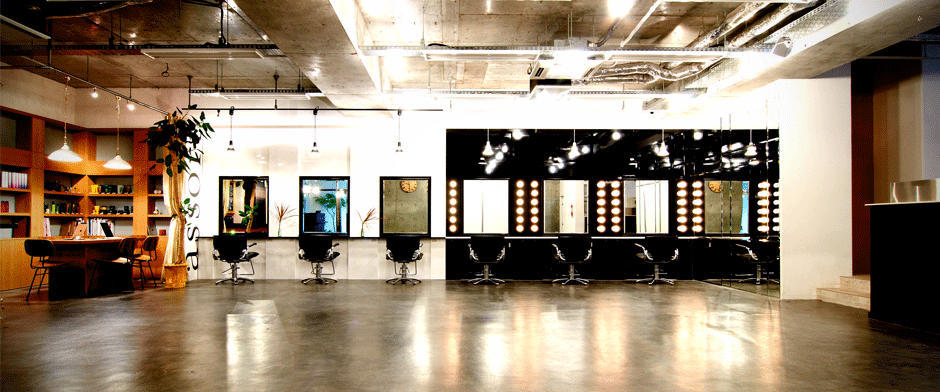
My salon!
I had to meet my friend the same day I cut my hair. Since I came by bicycle, thinking I would have enough time to park it back at my dorm and then take the train, I ended up leaving it parked by the closest train station. My hair stylist told me that as long as I come back for it within 24 hours, the police won’t take my bike away. The next day I came back for my bicycle after class and tore the pink warning letter that the police issues when you illegally park your bicycle. On the way home, I took a different route since I wanted to meet up with my friend in Shibuya.
I always biked pasted Shibuya on my way to Harajuku and thought it would be easy to get back to where I lived from there. Well, after going deep into Shibuya, getting out was quite difficult because it is so densely populated and big. When I asked the employee working at a Family Mart there for directions to Meidaimae, she told me that it was impossible. I should stop asking people working in Family Mart for directions.
After heading in the wrong direction, I eventually was directed the right way to Meidaimae. On the way, I eventually got to a familiar street, the one I take to get to Harajuku. From that point on, I did not need to stop every 5 minutes to ask for directions.
Everything else that happened this week was nothing out of the ordinary~ so that’s it for this post!
-Sampson
I have been in Tokyo a little over a month now. Studying abroad here has been a great experience for me. Although it was difficult applying for Meiji University and scholarships with having classes to focus on, it all paid off at last! I expected myself to enjoy living in Japan, but I did not expect to enjoy it so much that I would seriously consider living here one day. I already have a bank account here as well as several point cards too that I will bring back to America to remind me of the good time I had here.
Golden week has just begun in Japan. It’s a week with several Japanese holiday such as the Emperor’s birthday and Children’s Day. For Meiji University students, we only get 2 days off, in addition to our weekend, while students from other schools and workers get a full week off! We rarely get holidays off here in the Japanese academic calender. I realize how much I took American holidays for granted after coming here. For my holiday, I plan on visiting Korea while I still have the opportunity~
I got to visit Tokyo University a few times because my friend works at a convenient store there. Tokyo University is Japan’s Harvard. It is really big and grandeur as expected of Japan’s top university. Besides students who study there, I saw many high school students and various people like me who are just visiting the school. It is distinguished by its Japanese style gate, where people often take pictures at.
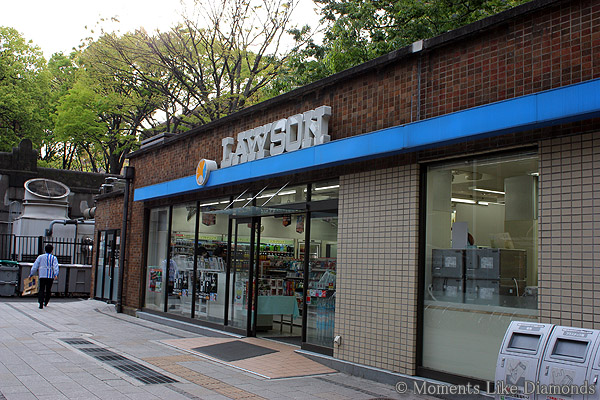
the Lawson convenient store at Tokyo University where my friend works
I went to a Omatsuri, or festival last Sunday at Koenji, a station away from my school campus with the Meiji student who went to New Paltz last semester! There, I got to see many performances throughout the area-from magic acts, comedy, juggling, diabolo, Chinese Opera, acrobatics on the street along with people enjoying the weekend with their friends and family. There were even performers from America and Canada at the Omatsuri. Despite being a festival, it still felt fast paced because there are so many performances that all lasted half an hour. It was impossible to see everything we wanted to see in a day.
I do realize the order of this post does not flow right, but a lot has really happened. I am still processing everything I saw! Also, I already have a problem with my bicycle. I need to replace one of the tires already~It should be fixed by my next post!
-Sampson
I purchased my first bicycle from Suginami Green Cycle this week. The shop only sells refurbished bicycles for as cheap as 6,500 yen on certain days of the month. In Japan, since there are so many people ride bicycles, there are designed parking areas for bicycles. The government takes bicycles that were illegal parked and sells them through shops such as the one I went to. Mine cost 8,000 yen, or around 80 dollars and is equipped with a basket.
I spent my first morning in Japan riding a bike along with my friend. However he laughed at me because I did not know how to ride a bike. My father never taught me how to ride one when I was little. What makes that irony is that my father was good at riding and fixing bikes. Right after I bought my bike, I used it to get to my school campus in Nakano. I ended up lost several times and ultimately late to class. The trip would have taken 30-40 minutes if I did not get lost. But I was proud of myself because I can ride a bike well enough by then. I stopped using my bike to get to school because I did not want to pay for parking every time(100 yen each time can add up really fast, and I had a commuter pass anyways).
Since I did not pack enough clothes, I took the opportunity to buy new and more stylist clothing here. For anything related to fashion in Tokyo, Harajuku and Shibuya are the places to go. Just walking down the streets in those areas, you will see tons of unique styles that you cannot even find in New York City. They are also affordable, though some shopping districts like the Ginza(which I have been to) are really meant for upper class people.
I have decided to take one more class in Japanese on Saturdays because my campus-mate persuaded me into it. Now my commuter pass will be even more worth it since I need to go to school everyday of the week besides Sunday. In comparison to my Comparative Culture class, this professor speaks more clearly and has a great sense of humor. Since his class is “East Asian studies,” he allows his students to write in English, Japanese, Chinese, and Korean. This means that he can also speak and understand all those languages. I am really impressed by him~
I really am enjoying my life here. Although though I have been here a little less than a month, I already do not want to leave here. Tokyo has become a 4th home for me. America is my first home (where I was born), Vietnam is my second home (where my family originated from), and Australia is my third home (where most of my mom’s side of the family now live). If I ever lose one of them, I will always have another one to return to. Perhaps, it is because I had to start my life from scratch here that I feel so strongly about Tokyo.
Even though I dormed at New Paltz, I still felt somewhat trapped. I was literally trapped too because I could not go anywhere without a car. Although having a roommate was a good experience for me, I would rather have my own room. Living with a roommate means that you have to adapt to their lifestyle in order to have a healthy relationship with them. Not having a roommate allows you to develop your own lifestyle and thrive in it.
The high cost of living in Tokyo encouraged me to cook most of my meals. The food in Japanese restaurants tastes so good, but the serving size is usually not enough to make me feel full. Meanwhile at New Paltz, it was impractical to cook most of my meals because everyone in the building shared the same kitchen in addition to having a meal plan. I had to go into “wasteful mode” in order to finish it all my dinning dollars by the end of the semester. This means that I spent even more money than I had to by cooking.
Do not misunderstand me because I still love New Paltz and the people there. What I am trying to say is that everyone should at study abroad for at least semester and see what it would be like if you lived in completely different. environment. Living a different lifestyle helps you discover yourself.
The pace of life in Tokyo is even faster than New York City. I used to complain to myself about how crowded the trains are during rush hour. By the time I return to NYC, I’d think that the trains are not crowded at all. Trains in Tokyo are about are similar to European train stations; going into one of them makes you feel like you are at an airport.
I finally obtained my commuter pass, which will let me use the train lines between Nakano station (where my school’s newly opened campus is located), and Meidaimai station. The total cost would be around 200 dollars for 4 months. Although it is restricted to only the route I need to take for school and back, it will make fares going to other stations cheaper as well. Plus, I can use points in the card to buy drinks at the vending machine or even pay for merchandises within Tokyo!
Classes began on April 10th at Meiji University! A period of class is an hour and thirty minutes long. Every class meets once a week too! That is half the work we do at New Paltz! I would not mind studying here for four years since I would have a lot more free time to focus on other extracurricular activities. However, this also means more independent studying is required for students here. Luckily my classes do not require me to buy a lot of textbooks. The cost of living is higher in Tokyo than New York City, so I need to budget myself.
my school campus!
I am taking three different Japanese classes that each focus on a different area of the language, which are reading, writing, and speaking. Unfortunately they are beginner level classes because I did not do well on my Japanese placement exam. Looking back, I should have guessed the remaining 30+ questions that I did not complete. There would be a 20% chance of me getting enough points to be placed in intermediate level. However even in these beginner level classes, I still learn new things and see what I was doing wrong before.
My remaining classes are Comparative Culture, Language and Culture, Modern Japanese History, and Physical Education. Out of these, one of the classes will be conducted in Japanese only! I attended the first class and found myself being unable to understand a lot of the vocabulary the professor used. The same day, I went out to buy my Denshi Jisho, or electric-powered dictionary. It costed around 100 dollars! I never imagined myself going this far to learn a language.
My campus-mate is a Vietnamese girl who I known about through the students from Meiji University last semester. Since I am also Vietnamese, I find relief in being able to speak my native language in a foreign country. Not to mention that she is a really, how can I say, a person who can put a smile on other people’s faces. Although she teases me all the time, I can see her good intentions. She is my senpai, or senior since she is a junior at Meiji University. Almost everyone I know here so far are my senpais, with the exception of a few international students who plan to study here for four years. They would be considered my kohai, or junior.
So far I have seen a couple of my friends who studied at New Paltz, from last year and last semester. It is more difficult to meet up with my friends from last year because they are seniors now. They are busy job hunting, which is highly competitive in Japan. I wish them the best of luck~their experiences abroad will surely make them stand out among the bunch.


